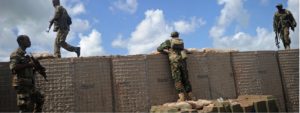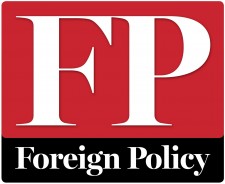Last week, the U.N. Security Council unanimously agreed to extend the African Union Mission in Somalia (AMISOM) mandate in the country until May 2019. The security situation has been getting worse by the day. On Sunday, two car bombs killed at least six people; one detonated in the capital, Mogadishu, and the other in a nearby town. A few days before, a popular young entrepreneur was murdered, sparking protests demanding accountability and better security.

AMISOM first deployed to Somalia in 2007 with a six-month authorization to counter al-Shabab, a militant anti-government group. Although initially a marginal peacekeeping force of privately trained Ugandan soldiers, AMISOM has since expanded in size and in scope of mandate, and is now comprised of an estimated 22,000 troops from Uganda, Burundi, Ethiopia, Kenya, Djibouti, and Sierra Leone. Unlike typical peace-support missions, AMISOM has taken the lead role in the counterinsurgency campaign, filling in as a de facto army until the Somali National Army (SNA) is strong enough to counter the jihadi group on its own.
“Somalia is like cleaning a pig,” one Ugandan AMISOM colonel told Foreign Policy. “You clean it, and it gets dirty.”
He compared Somalia to Afghanistan. If the coalition in Afghanistan left, he argued, the Taliban would easily take the country back. The same was true for Somalia. Whether or not the colonel’s assessment is accurate, the extension of AMISOM’s mandate, now with more ambiguous language about an exit date, underscores the SNA’s grim situation.
Somalia, which Transparency International has rated the world’s most corrupt country for 11 years running, represents the worst of modern war and the international state-building economy. But Somalia wasn’t always a war zone. In the first decade after the British Somaliland protectorate and the U.N.-administered former Italian Somaliland colony gained independence and unified in 1960, the Somali Republic was a stable, relatively prosperous democracy. As politicians stoked nationalist sentiment in the name of a Greater Somalia, the country sought to build a formidable army, known locally as “The Lions of Africa,” with Soviet assistance. At the time, military academies in the country were so well resourced they had tanks to spare for practical training.
These days, after decades of military dictatorship, failed foreign escapades, civil war, and armed insurgency, there’s not even adequate funding for essentials like radios and protective gear. The SNA’s soldiers use their mobile phones—easily tapped by Hormuud Telecom, which has a sizable market share and plenty of al-Shabab influence—to communicate when fighting. Many operate in flip-flops.
Meanwhile, a conglomeration of countries are paying each other, and each other’s companies, ostensibly in support of Somalia as it rebuilds a national army. Each has its own military models that differ in ways big and small, from the way that soldiers salute to the chain of command. More significantly, each has different funding streams, various internal alliances, and broader strategic agendas.
Turkey has its own military academy. Qatar has one as well. The United Arab Emirates’ training facility shut down in April, a proxy in the Persian Gulf dispute. The Egyptians and the Sudanese are training officers. The British are conducting training in their own center, south of Mogadishu, in Baidoa. And the United States, as well as private U.S.-based security firms, are working with the Danab special operations forces on Baledogle air base. The United States used to provide funding for fuel and food for the SNA proper, but suspended that support in December because of fraud.
The SNA “could be highly effective,” said a foreign advisor to the Defense Ministry, who has worked in more than 20 countries and wishes to stay anonymous. “Turning the SNA into an army here, while difficult, is doable,” he added. But, he argued, “the way we’re doing it is impossible.”
After so many attempts at state-building and training national armies—not least of all in Iraq and Afghanistan—it seems as if the international community is following a failed blueprint.
“The West has trained the three most abysmal armies in the world: the Iraqi Army, the Afghan Army, and Somali Army,” said Stig Jarle Hansen, an associate professor of international relations at the Norwegian University of Life Sciences.
None of this bodes well for the Somali people, and suggests that, even if AMISOM eventually follows through on its announced intent to leave, there will be private security firms, peacekeeping missions, and mercenaries in the country for the foreseeable future.
Read more: Somalia Is a Country Without an Army
Source: FP



